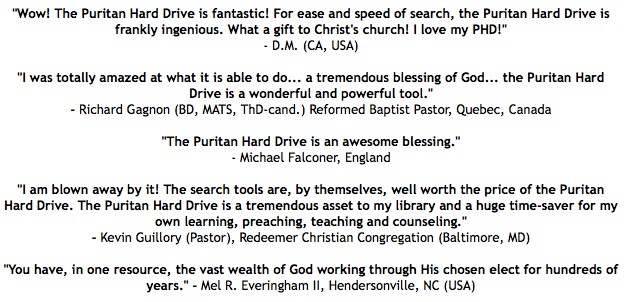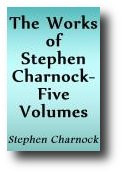 Loading... Please wait...
Loading... Please wait...- SWRB Home
-
Free Resources
- Short Listings Of Free Reformation & Creation Resources
- Free Reformed, Puritan, Covenanter and Creationist Videos
- Thousands of Links to Free Audio, Video and Printed Resources
- Free Puritan Books, Reformed MP3s, and Calvinist Videos
- Puritan Quotes, Free Reformation MP3s, Reformed Books and Calvinist Videos From PuritanDownloads.com On FaceBook
- Shipping & Returns
- Blog
- Privacy Policy
- Contact Us
- Payment Options
- Help
-
About Us
- Sitemap
Pastor Scott Brown, on the left in the video above, is the Director of the National Center for Family-Integrated Churches (NCFIC)
Resource Categories
- PURITAN HARD DRIVE REVIEWS
- PASTOR ROB VENTURA ON THE PURITAN HARD DRIVE
- DR. VODDIE BAUCHAM, JR. ON THE PURITAN HARD DRIVE
- R. C. SPROUL ON SWRB
- DR. JOEL R. BEEKE ON THE PURITAN HARD DRIVE
- PASTOR GREG L. PRICE ON THE PURITAN HARD DRIVE
- DR. MATTHEW MCMAHON ON THE PURITAN HARD DRIVE
- PASTOR SCOTT BROWN ON THE PURITAN HARD DRIVE
- PASTOR W. J. MENCAROW ON THE PURITAN HARD DRIVE
- JOAQUIN FERNANDEZ ON THE PURITAN HARD DRIVE
- PASTOR DAVID SILVERSIDES ON THE PURITAN HARD DRIVE
- JOHN HENDRYX ON THE PURITAN HARD DRIVE
- PASTOR KEVIN GUILLORY ON THE PURITAN HARD DRIVE
- RICHARD BENNETT ON THE PURITAN HARD DRIVE
- DR. KENNY RHODES ON THE PURITAN HARD DRIVE
- JUSTIN RAWSON ON THE PURITAN HARD DRIVE
- PASTOR JAMES WALLACE ON THE PURITAN HARD DRIVE
- PASTOR RICHARD GAGNON ON THE PURITAN HARD DRIVE
- PASTOR JOE HAYNES ON THE PURITAN HARD DRIVE
- DR. STEVEN DILDAY ON THE PURITAN HARD DRIVE
- PASTOR ANDREW COMPTON ON THE PURITAN HARD DRIVE
- TERENCE ELLARD ON THE PURITAN HARD DRIVE
- PASTOR JERRY JOHNSON ON THE PURITAN HARD DRIVE
- PASTOR DAVID PETRIE ON THE PURITAN HARD DRIVE
- JIM DODSON ON THE PURITAN HARD DRIVE
- PASTOR BRIAN SCHWERTLEY ON THE PURITAN HARD DRIVE
- PASTOR PHIL GIBSON ON THE PURITAN HARD DRIVE
- MEL R. EVERINGHAM II ON THE PURITAN HARD DRIVE
- PAUL BLYTH ON THE PURITAN HARD DRIVE
- STEVE KETTLER ON THE PURITAN HARD DRIVE
- D. M. (CALIFORNIA) ON THE PURITAN HARD DRIVE
- MICHAEL CAUGHRAN ON THE PURITAN HARD DRIVE
- WIILIAM NOPPER IV ON THE PURITAN HARD DRIVE
- LINDA THERIAULT ON THE PURITAN HARD DRIVE
- WILLIAM WARNOCK ON THE PURITAN HARD DRIVE
- ROBERT KOH ON THE PURITAN HARD DRIVE
- WHAT'S ON THE PURITAN HARD DRIVE?
- ALL PURITAN HARD DRIVE VIDEOS
- PHD-ODE INSTALLATION VIDEOS
- COMMENTS ON SWRB
- ALL PURITAN QUOTE VIDEOS
- PURITAN HARD DRIVE SCREENSHOTS
- PURITAN HARD DRIVE MINISTRY AND DONATION OFFERS
- TABLE OF RESOURCE CATEGORIES
- Advanced Studies
- SWRB SERMONAUDIO MOBILE APP
- Apologetics
- Assurance
- Attributes and Holiness of God
- Augustine
- Banner of Truth
- Baptism
- Beginners
- Bibles (Geneva, KJV, Hexapla, etc.)
- Biblical Counseling
- BIBLICAL HD COLLECTION
- Biblical Interpretation (Hermeneutics)
- Biographies and Autobiographies
- Calvinism and the Sovereignty of God
- CALVINISM HD COLLECTION
- CALVINIST CLASSICS HD COLLECTION
- Charles Spurgeon
- Children's Books
- CHRISTIAN EDUCATION HD COLLECTION
- Christian History
- Church Government
- Civil Government and Resistance
- CLASSIC CHRISTIAN HD COLLECTION
- Classic Puritan and Reformed Sets
- Commentaries
- Contemporary Issues
- Covenant Theology and Covenanting
- COVENANTER HD COLLECTION
- Covenanters and Covenanted Reformation
- Creation and Creationism
- Creeds, Confessions and Covenants
- Cults, False Religions, Psychology, Humanism
- Dealing with Affliction, Suffering, and Sickness
- Debates
- Dutch Reformed
- Education and Home Schooling
- English Puritans, Covenanters and Reformers
- Family, Children, Home, and Family Worship
- First Reformation
- Five Points of Calvinism (TULIP)
- For Pastors and Elders
- For Seminary Students
- FREE PURITAN & REFORMATION MP3 AUDIO SERMONS/BOOKS
- FREE PURITAN BOOKS, REFORMATION MP3s, PDFs, VIDEOs
- George Gillespie
- God's Law, The Ten Commandments, etc.
- Greg L. Price on Headcoverings
- Heaven, Hell and the Final Judgment
- Holy Days (Lord's Day, Christmas, Easter, etc.)
- HOME SCHOOL HD COLLECTION
- Intermediate Studies
- John Bunyan
- John Calvin
- John Knox
- John Owen
- Jonathan Edwards
- Justification
- Languages, Dictionaries, Reference, etc.
- LOOK WHO LOVES THE PURITAN HARD DRIVE
- Lord's Supper (Communion)
- Marriage, Courtship, etc.
- Martin Luther and Lutheranism
- Martyrs and Persecution
- Other Protestant Works
- Predestination and Providence
- PRESBYTERIAN HD COLLECTION
- Presbyterians and Presbyterianism
- Prophecy, Antichrist, and Eschatology
- PROTESTANT HD COLLECTION
- PSALM SINGING MP3s (COMPLETE SET)
- Psalters, Psalm Singing and Music
- Puritan Facts
- PURITAN FAST SERMONS (1640-1653) - 34 VOLS SET
- Puritan Fast Sermons 1640-1653
- Puritans and Puritanism
- PURITAN HARD DRIVE
- REFORMATION HD COLLECTION
- Reformation History
- Reformed and Puritan Classics
- Reformed Baptist
- REFORMED BAPTIST HD COLLECTION
- REFORMED HD COLLECTION
- REFORMED PRESBYTERIAN HD COLLECTION
- Reformed Presbytery, RPNA Protesters, etc.
- Reformed Theology
- Reformed Worship, The Regulative Principle, etc.
- Roman Catholicism, the Jesuits, Islam, etc.
- Salvation and Evangelism
- Samuel Rutherford
- Sanctification, Prayer and Holiness
- Scottish Covenanters
- Scottish Presbyterianism
- Scripture Song MP3s (Psalms and Bibles Verses)
- Second Reformation
- Separation, Unity, Uniformity, etc.
- Sermons and Sermon Collections
- Solemn League and Covenant
- Theology and Doctrine
- Third Reformation
- Thomas Watson
- Westminster Confession, Assembly and Divines
- Authors (All A to Z)
Phone Orders:
(780) 450-3730
To obtain free Reformation books, Puritan MP3s and Calvinistic videos, SWRB discount coupons, etc., add yourself to SWRB's Puritan and Reformed email list by using the form above.
The Works of Stephen Charnock 5 Volume Set
Resource Details
Resource Description
Stephen Charnock's Existence and Attributes of God make up the first two volumes in this five volume set of Stephen Charnock's Works.
The Existence and Attributes of God is the greatest Puritan treatise on the perfections of God, and perhaps the greatest of all times. Here, Stephen Charnock reflects on Scripture to develop a better understanding of the nature and being of God. In true Puritan fashion, Charnock makes practical application of all the doctrinal content he develops. Thus, Charnock's work is rightly regarded as simultaneously a scholarly and devotional classic (emphases added).
- Dr. Joel Beeke
This book covers topics such as: the existence of God; the failure of practical atheism; the spiritual nature of God; spiritual worship; God's eternality; God's immutability; God's omnipresence; God's knowledge (omniscience); God's wisdom; God's power; God's holiness; God's goodness; God's dominion; God's patience.
Stephen Charnock was an English minister during the seventeenth century. In the late 1650s he spent some time in Ireland as chaplain to the Governor, where his preaching attracted considerable attention. After King Charles II came to power in 1660, Charnock returned to England but was not permitted to hold a public ministry. He could only minister privately. This changed in 1675 when government restrictions were relaxed, and Charnock became co-pastor with Thomas Watson of a Presbyterian church in London. Charnock died in 1680.
William Symington, in his brief biography of Charnock at the beginning of this set, notes that Charnock had few friends, though those he had were godly and intelligent. "But his best and most highly cherished companions were his books, of which he had contrived to secure a valuable though select collection. With these he held frequent and familiar intercourse. Great part of his time, indeed, was spent in his study" (p. 13, emphases added).
To a person of these studious habits it may easily be conceived what distress it must have occasioned to have his library swept away from him. In that dreadful misfortune which befell the metropolis in 1666, ever since known as 'the fire of London,' the whole of Charnock's books were destroyed. The amount of calamity involved in such an occurrence can be estimated aright only by those who know from experience the strength and sacredness of that endearment with which the real student regards those silent but instructive friends which he has drawn around him by slow degrees; with which he has cultivated a long and intimate acquaintance; which are ever at hand with their valuable assistance, counsel and consolation, when these are needed; which, unlike some less judicious companions, never intrude upon him against his will; and with whose very looks and positions, as they repose in their places around him, he has become so familiarized, that it is no difficult thing for him to call up their appearance when absent, or to go directly to them in the dark without the risk of a mistake. Some may be disposed to smile at this love of books. But where is the scholar who will do so? Where is the man of letters who, for a single moment, would place the stately mansions and large estates of the 'sons of earth' in comparison with his own well-loaded shelves? Where the student who, on looking round upon the walls of his study, is not conscious of a satisfaction greater and better far than landed proprietor ever felt on surveying his fields and lawns -- a satisfaction which almost unconsciously seeks vent in the exclamation, 'My library! a dukedom large enough!' Such, and such only, can judge what must have been Charnock's feelings, when he found that his much cherished volumes had become a heap of smouldering ashes (p. 14).
Symington also points out that,
All Charnock's writings are distinguished for sound theology, profound thinking, and lively imagination. They partake of that massive divinity for which the Puritan Divines were in general remarkable, and are of course orthodox in their doctrinal statements and reasonings. . . . In a word, for weight of matter, for energy of thought, for copiousness of improving reflection, for grandeur and force of illustration, and for accuracy and felicitousness of expression, Charnock is equalled by few, and surpassed by none of the writers of the age to which he belonged. . . . There were giants in literature in those days, and STEPHEN CHARNOCK was not the least of the noble fraternity (p. 17).
And because his theology was so sound, there is "not one of all the Puritan Divines whose writings can with more safety be recommended to the attention of students of divinity and young ministers" (p. 18).
Volume 1 of the Works of Stephen Charnock includes:
- Life and Character of the Author. Page 9.
- Preface. Page 21.
- Discourse I. On the Existence of God. Psalm xiv. 1.--The fool hath said in his heart, There is no God. They are corrupt, they have done abominable works, there is none that doeth good. Page 25.
- Discourse II. On Practical Atheism. Psalm xiv. 1.--The fool hath said in his heart, There is no God. They are corrupt, they have done abominable works, there is none that doeth good. Page 89.
- Discourse III. On God's Being a Spirit. John iv. 24.--God is a Spirit: and they that worship him must worship him in spirit and in truth. Page 176.
- Discourse IV. On Spiritual Worship. John iv. 24.--God is a Spirit: and they that worship him must worship him in spirit and in truth. Page 204.
- Discourse V. On the Eternity of God. Psalm xc. 2.--Before the mountains were brought forth, or ever thou hadst formed the earth and the world, even from everlasting to everlasting, thou art God. Page 276.
- Discourse VI. On the Immutability of God. Psalm cii. 26, 27.--They shall perish, but thou shalt endure: yea, all of them shall wax old like a garment; as a vesture shalt thou change them, and they shall be changed: but thou art the same, and thy years shall have no end. Page 310.
- Discourse VII. On God's Omnipresence. Jeremiah xxiii. 24.--Can any hide himself in secret places that I shall not see him? saith the Lord. Do not I fill heaven and earth? saith the Lord. Page 363.
- Discourse VIII. On God's Knowledge. Psalm cxlvii. 5.--Great is our Lord, and of great power: his understanding is infinite. Page 406.
- Discourse IX. On the Wisdom of God. Romans xvi. 27.--To God only wise, be glory through Jesus Christ for ever. Amen. Page 498 .
Volume 2 of the Works of Stephen Charnock includes:
- Discourse X. On the Power of God. Job xxvi. 14.--Lo, these are parts of his ways: but how little a portion is heard of him? but the thunder of his power who can understand? Page 5.
- Discourse XI. On the Holiness of God. Exodus xv. 11.--Who is like unto thee, O Lord, among the gods? who is like thee, glorious in holiness, fearful in praises, doing wonders? Page 108.
- Discourse XII. On the Goodness of God. Mark x. 18.--And Jesus said unto him, Why callest thou me good? there is none good but one, that is, God. Page 209.
- Discourse XIII. On God's Dominion. Psalm ciii. 19.--The Lord hath prepared his throne in the heavens; and his kingdom ruleth over all. Page 356.
- Discourse XIV. On God's Patience. Nahum i. 3.--The Lord is slow to anger, and great in power, and will not at all acquit the wicked: the Lord hath his way in the whirlwind and in the storm, and the clouds are the dust of his feet. Page 472.
- Index. Page 525.
- Index of Texts. Page 541.
Volume 3 of the Works of Stephen Charnock includes:
- The New Birth.
- Discourses.
- To The Reader, The Necessity of Regeneration. John III. 3, 5.
- A Discourse of the Nature of Regeneration. 2 Cor. V. 17.
- A Discourse of the Efficient of Regeneration. John I. 13.
- A Discourse of the Word, The Instrument of Regeneration. James I. 18.
- A Discourse of God's Being the Author of Reconciliation. 2 Cor. V. 18, 19.
- A Discourse of the Cleansing Virtue of Christ's Blood. 1 John I. 7.
Volume 4 of the Works of Stephen Charnock includes:
- The Knowledge of God.
- A Discourse of the Knowledge of God. John xvii. 3.
- A Discourse of the Knowledge of God in Christ. John xvii. 3.
- A Discourse of Conviction of Sin. John xvi. 8, 9.
- A Discourse of Unbelief, Proving it is the Greatest Sin. John xvi. 9.
- A Discourse of the Misery of Unbelievers. John iii. 36.
- A Discourse Shewing Who Are Unbelievers. John vi. 64.
- A Discourse of the End of the Lord's Supper. 1 Cor. xi. 26.
- A Discourse of the Subjects of the Lord's Supper. 1 Cor xi. 28, 29.
- A Discourse of the Unworthy Receiving of the Lord's Supper. 1 Cor. xi. 27, 29.
- A Discourse of Self-Examination. 2 Cor. xiii. 5.
- A Discourse of the Knowledge of Christ Crucified. 1 Cor. ii. 2.
- A Discourse of Christ Our Passover. 1 Cor. v. 7.
- A Discourse of the Voluntariness of Christ's Death. Eph. v. 2.
- A Discourse of the Acceptableness of Christ's Death. Eph. v. 2.
- A Discourse of Obedience. John xv. 14.
Volume 5 of the Works of Stephen Charnock includes:
Truth and Life. Discourses.
- A Discourse of the Necessity of Christ's Death. Luke xxiv. 26.
- A Discourse of the Necessity of Christ's Exaltation. Luke xxiv. 26.
- A Discourse of Christ's Intercession. 1 John ii. 1.
- A Discourse of the Object of Faith. John xiv. 1.
- A Discourse of Afflictions. Heb. xii. 5-11.
- A Discourse of the Removal of the Gospel. Rev. ii. 5.
- A Discourse of Mercy Received. Ps. lvi. 12, 13.
- A Discourse of Mortification. Rom. viii. 13.
- A Discourse Proving Weak Grace Victorious. Mat. xii. 20.
- A Discourse of the Sinfulness and Cure of Thoughts. Gen. vi. 5.
- A Discourse of the Church's Stability. Ps. lxxxvii. 5.
- A Discourse Upon the Fifth of November. Exod. xv. 9, 10.
- A Discourse of Delight in Prayer. Ps. xxxvii. 4.
- A Discourse of Mourning for Other Men's Sins. Ezek. ix. 4.
- A Discourse for the Comfort of Child-Bearing Women. 1 Tim. ii. 15.
- A Discourse of the Sins of the Regenerate. 1 John iii. 9.
- A Discourse of the Pardon of Sin. Ps. xxxii. 1, 2. Man's Enmity to God. Rom. viii. 7. The Chief Sinners Objects of the Choicest Mercy. 1 Tim. I. 15.
- Index.
- Index of Texts.
All resources for sale on this website, with the exception of Scottish Metrical Psalms MP3s, are available on the Puritan Hard Drive .
VIDEO INTRODUCTION TO THE PURITAN HARD DRIVE


Find Similar Resources by Category
Phone Orders:
(780) 450-3730
To obtain free Reformation books, Puritan MP3s and Calvinistic videos, SWRB discount coupons, etc., add yourself to SWRB's Puritan and Reformed email list by using the form above.








































